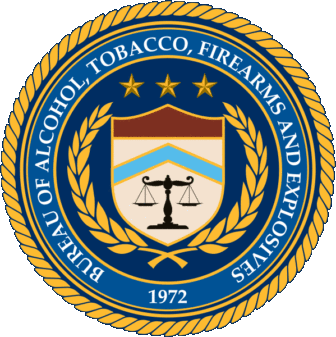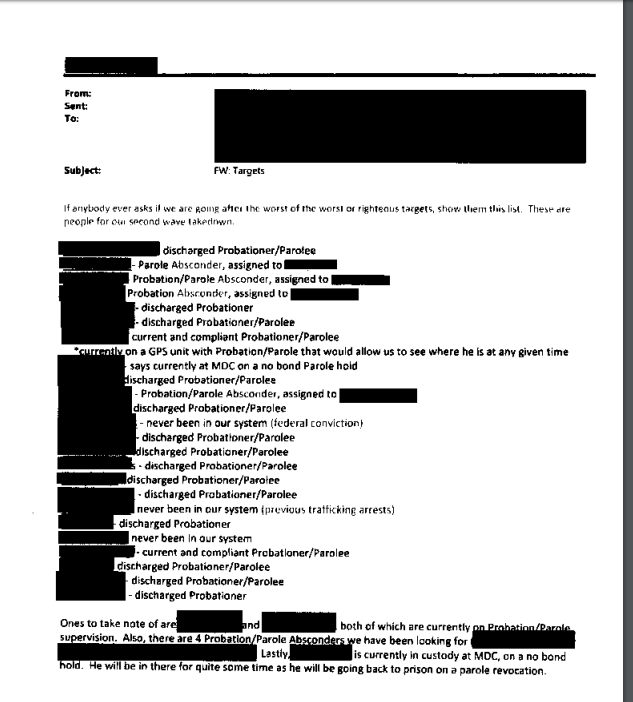Days before federal prosecutors and law enforcement officials announced more than 100 arrests from an undercover operation in Albuquerque in 2016, the sting’s lead agent was thinking about who, exactly, had been arrested.
“If anybody ever asks if we are going after the worst of the worst or righteous targets, show them this list,” Special Agent Russell Johnson of the federal Bureau of Alcohol Tobacco Firearms and Explosives (ATF) wrote in an Aug. 4, 2016, email to colleagues.”These are people for our second wave takedown.”
The email names 24 individuals and notes each person’s probation or parole status: 14 had successfully completed their obligations to the state, two were listed as “current and compliant probationer/parolee,” three had never been on probation or parole and four were “absconders.”
The 24 names are blacked out, as are the sender and recipients of the email and a handful of other words.
 Eight days after Johnson dashed off the email, a phalanx of high-ranking local, state and federal law enforcement officials told the press they had taken “the worst of the worst” off the city’s crime-ridden streets.
Eight days after Johnson dashed off the email, a phalanx of high-ranking local, state and federal law enforcement officials told the press they had taken “the worst of the worst” off the city’s crime-ridden streets.
The controversial operation has come under scrutiny over the past year for the highly disproportionate number of black people who were arrested. Meanwhile, the sting netted few, if any, of the hardened, repeat violent criminals supposedly targeted.
Those questions match a pattern found in operations Johnson and other ATF agents have led around the country — operations that have provoked scrutiny from federal judges and newspaper investigations.
In all, 28 of the 103 arrested in the 2016 Albuquerque operation were black; that’s 27 percent, compared to the city’s black population of 3 percent. Criminal defense attorneys have accused the ATF of racial profiling.
Johnson, through testimony in court hearings last year, cited the “Memphis Mob,” an alleged drug gang with ties to Tennessee, as one reason for the arrest of so many black people. Johnson’s email surfaced in a court hearing last year for Lonnie Jackson and Diamond Coleman, two black defendants who are pursuing racial profiling claims.
Johnson never mentioned the “Memphis Mob” in the email, which he wrote as the four-month operation was wrapping up and the ATF agent was ruminating on who was arrested.
NMID obtained a copy of the email from the court after Johnson testified about it at two separate hearings late last year. It offers a window both into his thought process and what defense lawyers made of the correspondence and how it fits into allegations about the ATF’s conduct during the operation.
Johnson has testified several times in federal court in Albuquerque that he was aware of the critical coverage and harsh judicial opinions around the country. But he has said none of that factored into how ATF went about its business in subsequent operations because the agency “is not biased.”
Defense lawyers questioned Johnson at length about whether some of the people ATF arrested in the sting were “righteous targets.” They showed the agent reports detailing minor or nonexistent criminal histories for some of the people. Johnson declined to answer questions, saying that “many factors” went into agents’ decisions about whom to pursue.
Assistant Federal Public Defender Aric Elsenheimer pressed Johnson about the email, asking: “You sent it to others so that if there was any question or if anybody ever asks if you’re going after the worst of the worst or righteous targets, you were going to show them this list?”
“That’s absolutely incorrect,” Johnson replied, then added that it was simply a list of people who were set to be arrested in the operation’s “second wave.”
“So it wasn’t a trophy email,” Johnson said.
Elsenheimer then re-read the email back to Johnson and asked whether he was quoting from it correctly. He was, Johnson answered.
At a subsequent hearing on Dec. 13, Johnson testified that he didn’t know how many of the 24 people listed in the email were black.
It is not clear whether Johnson was anticipating criticism of the Albuquerque operation when he wrote the email in the summer of 2016. ATF has repeatedly denied interview requests to discuss the sting, Johnson has refused in-person interview requests, and the agency has declined to make him available to speak to a reporter.
